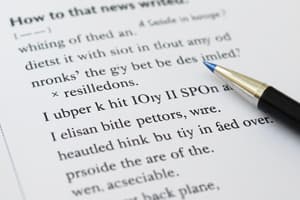Podcast
Questions and Answers
Which type of sentence is used to give instructions or commands?
Which type of sentence is used to give instructions or commands?
- Imperative (correct)
- Exclamatory
- Declarative
- Interrogative
What type of sentence is used to express excitement or strong emotions?
What type of sentence is used to express excitement or strong emotions?
- Interrogative
- Imperative
- Declarative
- Exclamatory (correct)
Which type of sentence makes statements, states facts, and answers questions?
Which type of sentence makes statements, states facts, and answers questions?
- Declarative (correct)
- Imperative
- Exclamatory
- Interrogative
Which sentence type often begins with question words like 'who', 'what', 'where', 'when'?
Which sentence type often begins with question words like 'who', 'what', 'where', 'when'?
What type of sentence invites readers to think critically and engage with the content?
What type of sentence invites readers to think critically and engage with the content?
Which type of sentence links multiple independent clauses with coordinating conjunctions or correlative conjunctions?
Which type of sentence links multiple independent clauses with coordinating conjunctions or correlative conjunctions?
How are declaratives and interrogatives different from exclamatory sentences in terms of punctuation?
How are declaratives and interrogatives different from exclamatory sentences in terms of punctuation?
Which type of sentence is used to compare two things based on a specific characteristic using words like more, less, than, or like?
Which type of sentence is used to compare two things based on a specific characteristic using words like more, less, than, or like?
What distinguishes compound sentences from other types of sentences?
What distinguishes compound sentences from other types of sentences?
In a compound sentence, how are the clauses linked?
In a compound sentence, how are the clauses linked?
Flashcards
Declarative Sentence
Declarative Sentence
Makes a statement and shares information.
Interrogative Sentence
Interrogative Sentence
Presents a question and seeks an answer.
Imperative Sentence
Imperative Sentence
Gives a command or instruction.
Exclamatory Sentence
Exclamatory Sentence
Signup and view all the flashcards
Comparative Sentence
Comparative Sentence
Signup and view all the flashcards
Compound Sentence
Compound Sentence
Signup and view all the flashcards
Study Notes
Exploring Different Types of Sentences
Sentences—those strings of words we string together to communicate ideas, express thoughts, and convey stories—are fundamental building blocks of written and spoken languages. While all sentences share the common goal of conveying meaning, they vary in structure, function, and complexity. Let's dive into some of these variations to better understand different types of sentences and their unique roles.
Declarative Sentence
Declaratives are probably the most familiar type of sentence; they make declarations, state facts, and answer questions with simple clarity. For instance: The sun rises in the east. This is a straightforward statement that shares information.
Interrogative Sentence
Interrogatives pose questions, inviting readers to think critically and engage with what they're reading. These sentences often begin with question words like who, what, where, when, etc., such as What did you have for breakfast?
Imperative Sentence
Imperatives give instructions or commands, telling someone how to do something rather than describing it. They generally start with verbs like go, eat, read or auxiliary verbs like let, have, etc.: Go outside right now.
Exclamatory Sentence
Exclamatories express excitement, surprise, delight, disappointment, frustration, and other strong emotions through exclamations like Wow!, Oh no! and so forth. Unlike declaratives or interrogatives, they don't end with punctuation marks like periods or commas. Instead, they typically close with an exclamation point (!) or an interrobang (‽), sometimes called an exclamation-question mark.
Comparative Sentence
Comparatives compare two things based on a specific characteristic using comparison words like more, less, than, or like. Examples could be: Her dress was more expensive than his. Or, She ran like the wind. Note that comparisons can also appear within phrases or clauses inside larger sentences, making them versatile tools for comparing items, concepts, actions, etc.
Compound Sentence
Compound sentences link multiple independent clauses by coordinating conjunctions (and, but) or correlative conjunctions (both...and, neither...nor). Each clause can stand alone as a separate sentence if needed. Some examples might be: I love pizza, but I hate broccoli. Or, Both my parents work, yet I still need allowance money.
In conclusion, various types of sentences serve distinct functions in communicating our messages effectively. By understanding their uses and recognizing them in our own writing, we become stronger writers and clearer speakers.
Studying That Suits You
Use AI to generate personalized quizzes and flashcards to suit your learning preferences.




